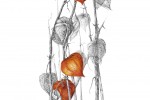Winter 2014: Prose
Messages
Non-fiction by Mary Mandeville
On the Monday before Thanksgiving, my sister Joan called with news the doctor had just given her. He said treatment was failing, said there were new tumors, said neither scalpel nor cyber-knife had done their jobs, said all the rocks on this damned rocky road have been turned over. He said get your affairs in order, Joan, you have about four weeks left.
The ache beneath my breastbone threatened to split me open. How long is four weeks? How short?
“I’m worried about Ally.” Joan spoke of her six-year-old daughter in a whisper.
“She’ll be okay.” I stated it like a complete certainty though I still felt that cracking sensation in my chest. Of course she worried about the daughter she adopted all alone.
“Maybe it’s better this way.” Joan’s voice turned thick.
We’d had variations of this conversation before, this idea of Joan’s that her cancer was a divine plan hatched to move her daughter to a “better” family of a mom and dad and two sisters instead of a single mother. The number of reservations I had about my youngest sister and her husband as Ally’s future parents was zero, but it broke my heart to hear Joan contemplate this line of thinking again. I put a hand over my mouth so she wouldn’t hear me sniffle.
“Maybe she’ll have a better life with Susan and Brad.” As her words trembled, I knew tears had begun to fall.
“Look,” I said, my voice big-sister firm, “you didn’t get cancer so Ally would go to a new home.” There were a thousand possible culprits behind the aggressive breast cancer, but the disruption of a little girl’s mother-daughter relationship wasn’t one of them. “She’ll be happy before too long.” I swallowed to keep my own voice from trembling. “But you are the one who gave her a great start in life.”
“I’m thinking of making some videotapes for her.” She got the words out through sniffles and gulps.
“Brilliant.”
We talked through our sorrow about what Joan might say on the tapes for her only child, about who would take care of her dog, about why the hell she got such a lousy, life-sucking cancer.
Where would she go? Would all her old dearly departed dogs be waiting, tails wagging, to greet her when she stepped onto some celestial field? Would she meet Dad, Grandma, Grandpa? Would she be born again to live another life – say in Ireland or Tibet? Would she come back as one of the German shepherds she loved?
“I hope you’ll send me a sign from wherever you are.” I wanted her to remember me, to keep in touch with me, as if this dying thing couldn’t separate us.
“I’ll do my best.” Giant sigh. “I don’t know what my messaging capabilities will be.”
I couldn’t stifle a laugh. My little sister, the telecommunications CEO and gadget girl; I bet she had major concerns about her upcoming ‘messaging capabilities.’
Later, I worried. Had I said everything I needed to say?
In four weeks it would be Christmas. Though our time together hadn’t yet run out, I wanted more. Just Christmas I prayed, a little to the bearded old white-man God of my childhood but mostly to a vague Divine I hoped like hell was listening. Can she at least live till Christmas?
I called my mother, my brothers, my youngest sister. Together we whispered, cried, and wondered aloud: What do you get a dying person for Christmas?
Then a friend made a suggestion.
Give her messages she said.
Messages?
Yes, she said. Every thought you ever wished you’d told her, or don’t want to regret not telling her. All of them. You have the chance. Write them down.
When my friend’s rabbi died, members of the synagogue bought stacks of colored origami paper. Everyone interested wrote messages for the family on those little squares. Then they folded them into Stars of David, pinned them to a large picture board, and presented them to his grieving loved ones. My friend wished they’d been able to present messages to the rabbi himself before he died.
This was the solution to the Christmas present dilemma. But how would I sell it to the whole family? My youngest sister, Susan, would be on board, sensitive, emotional, and communicative. My youngest brother, Tom, with his bent toward the expressive, would probably sign on. Our other brothers, practical, hard-working men, might find it too squishy and touchy-feely. I broached the subject anyway over long distance phone calls.
They surprised me. Yes, said Bud, a civil engineer who hides his sensitive side under a terse and prickly exterior. That’s a great idea. Paula and the kids will like it, too. Yes, said John, a never-married accountant who works for the IRS, I’ll be glad to. Yes, said Joe, a nuclear physicist who spends much time in the research lab and recently married Emiri, a brainy neurosurgeon from Japan.
We decided to pitch in on a fancy high-tech video camera as well, so she could make those tapes for Ally. The paper messages would be a Christmas present – fingers crossed – but the video camera needed to be ASAP. Thanksgiving. Pronto. My brothers would research and purchase the camera; we’d all get started on the hand-written messages.
Squares of crisp origami paper in all colors of the rainbow would soon be covered with messages to Joan. But how should we present them? Fold them into stars? Christmas ornaments? Hearts?
A message came via Facebook from my new sister-in-law Emiri.
I’ll fold them into cranes.
That’s perfect, I thought. Well, I guess you know how. To fold paper cranes, I mean. Could you? It’s not too much?
I could. I will.
At their mention, I wanted paper cranes and wanted them bad. The desire reverberated, touching something bigger than Joan and her individual cancer, bigger than our not-so-small family, bigger than us and our problems, offering hope where there hadn’t been any. My paper crane longing became a chord vibrating beneath my solar plexus. I was reminded of the endangered whooping cranes I watched lift off the ground at a sanctuary in Wisconsin, their decimated numbers gradually growing again; of Sadako, the Japanese girl immortalized in a book. Sick with leukemia because of radiation exposure from the atomic bomb dropped in Hiroshima, Sadako set to work making cranes.
Folding paper cranes for good fortune dated back to an ancient Japanese legend about cranes who were said to have lived a thousand years. Each folded crane became a wish for healing, long life, best of luck. One folded crane, one wish; one thousand cranes, a most special wish. Sadako tried to fold a thousand cranes before she died, an act of optimistic defiance in the face of waning hope.
I wanted cranes for Joan, and for all of us. Not the legendary thousand cranes – there was obviously not time for that – just enough to carry our messages. But it might be exploitive to load the task onto our newest family member just because she could fold them.
There might be a lot.
Emiri smiled at me over Facebook. I can do it. :-)
Seriously, it could be as many as fifty. I was doing the math on the time it might take: six siblings and mom, assorted spouses and kids, aunts and uncles; with two or three messages per person it would add up to forty or fifty pieces of paper, and to fold, what – twenty minutes per crane? That’s like a thousand minutes.
Not a problem. :-)
And so it was agreed.
At home in Portland, Oregon, my partner and I and our two sons sat around the dining room table. The boys surprised me, the way they dove into the task, writing some messages and drawing others. With minimal talk we each accumulated a small pile of tie-dyed origami squares, as if we hoped if we wrote enough or drew enough, we could change what was happening.
You welcomed me into the family.
You came to my adoption ceremony.
You’ve been an awesome mother. Ally’s been blessed to have you.
Best. Sister. Ever.
We stuffed our scrawled origami messages into envelopes. Joined by other notes, scribbled by five-year-olds and eighty-year-olds and even sulky teenagers, from us in Oregon and others in Washington, Idaho, and Montana, they soared across the country to Emiri in Boston, carrying a rainbow of sentiments on their papery wings.
How’s it going? I Facebook-messaged my sister-in-law. Our little family of four had sent off more than twenty messages, and I worried that with all the others, there might be too many.
Don’t worry. I can do it.
A couple weeks later I walked into Joan’s house. She’d made it to Christmas (maybe someone in heaven listened to my prayers after all). I wanted to look into the eyes made lopsided by a tumor and take stock of my sister’s heart. Before I could, the sight of a four-foot mobile, its many multicolored paper strands swirling in the breeze created by the open door, stopped me in the entry hall.
“Whoa.” I don’t know what I’d pictured, a bag maybe, or a box, or a pile of folded cranes, perhaps. Not this huge, surprising whirligig.
Emiri slipped to my side and greeted me with a small bow of head and shoulders. I reached my fingers out to touch the delicate paper structure. “It’s so many.”
“It’s a thousand.” Emiri’s husband, my brother Joe stood beside her with his arm around her shoulder, a broad beam lighting up his face. “I tried to help, but I folded about three for every hundred of hers.”
My eyes moved between Joe and Emiri. The sides of my throat squeezed together and caught my words on their way out. Emiri pressed her palms together, smiled, then closed her eyes and bowed again, more deeply this time. I bent at the waist, wanted to touch my fingers to the floor to show my thanks; instead, a simple lean and drop of chin to chest. “It’s beautiful. Thank you.”
“It has to be a thousand, you know.”
I did know.
My ten-year-old son pushed open the entry door I’d closed behind me. It was ten degrees on the side of Mt. Jumbo in Rattlesnake Canyon just outside Missoula, Montana. The rush of frigid air pushed the mobile and the paper birds fluttered in a semblance of flight. Our messages had flown cross country and back and now each colorful crane danced in the cold. The whole mobile spun on its string axis.
One thousand paper cranes.
* * *
Christmas was the last time I saw Joan as my fully functioning sister. I understood then it wasn’t Christmas that mattered, it was time with Joan. Our paper messages provided a way for us to accept the unacceptable and to celebrate and honor our sister before she left us forever. We wanted Valentine’s Day and Spring Equinox and Easter too, but what we got was Christmas and cranes.
Mom told me Joan took apart the message cranes – Emiri had made ‘message strands’ that could be snipped from the mobile leaving the rest intact – and read them on freezing Montana winter days. When the buttons on her smart phone overwhelmed her and the function of the remote control became baffling, our simple print on paper reached her. By the time I saw her at the end of January, cancer was eating her brain and she didn’t remember. By the end of February, she was gone.
After she died, my mother, brothers, younger sister and I, each in our own time, read the thoughts that lingered on feather-weight origami squares. It helped us weather those first post-Joan weeks. Unable to avoid losing someone cherished, we could at least hold her – and each other – with our words. The sentiments we shared became a way of joining hands to walk with someone we loved to a gate we could not pass through.
One piece of pink paper had these printed words: You never let me down. Not once. Not ever. My fingers flew to my lips when I read it.
“Do you know who wrote this, Mom?” I walked across the shiny wood floor from the dining table to where Mom sat sipping coffee in the breakfast nook and placed the wisp of paper in front of her.
“I thought maybe you did.” She thought for a moment. “But it could have been John.”
“Or Susan,” I said, but then thought maybe it was a niece or nephew instead. “Or Chris or Rachel.”
Mom took another swallow from her mug. “It could have been anyone.”
My sister must still be working out her messaging capabilities because I haven’t heard from her in the crystal clear way I hoped. I admit to wishing for a message on my smart phone – a text I couldn’t otherwise explain or some crazy technical malfunction that I’d believe was from her. The appearance on my doorstep of a stray German shepherd would do it, too.
I’ve survived difficulty before: the death of my father, the fracture of a long-term relationship, the passing of friends. Somehow, even through the densest sorrow, my heart kept on beating. What I hadn’t realized before Joan’s death and the cranes is that a grieving heart is capable of soaring. I know because mine did, with the strength of a thousand pairs of wings.
That message from my sister? Only time will tell. But she never let me down in life. Not once. Not ever.
So I can wait.
| |

|

|
 |
 |
 |
 |
 |
||||
|
Multi-faceted, poignant and inspiring. We’ve caught thirteen never-before-published poems by twelve master-class voices. |
Five women share their talent and themselves in new, surprising and heartfelt ways. |
Established craftswomen and aspiring visionaries add colorful richness to our most recent issue. |
The lyrical language of five young poets will delight you. |
Meet the authors and artists who make the Winter 2014 edition a rich, varied and engaging experience. |

|
LETTER FROM THE MANAGING EDITOR
POETRY After the Ice Storm by Linda Strever Waiting for a Diagnosis by Linda Strever Anticipation by Penelope Scambly Schott How to Survive the Loss of Your Best Friend by Diane Averill Current Conditions by Carol Ellis For a Hot Shot by Susan DeFreitas Focal Distance by Jenna Thompson Bridge by Jennifer Liberts Weinberg Motherhood by Elizabeth Stoessl Nice Girl Regrets by Pattie Palmer Baker Lost Child Lullabye by Tiah Lindner Rephael To Inhabit the Body by Willa Schneberg Love Letter by Annie Lightheart PROSE Like Water and Stones by B.E. Scully Messages by Mary Mandeville Fear Jars by Jessica Zisa Pie by Susan Lehman Confinement by Valerie Wagner ART Where the Buffalo and Unicorn Once Roamed by Katie Todd Midwestern Dreamin' by Katie Todd Monday's Child by Sarah Fagan Sweet Tea by Sarah Fagan The Daydream by Kendall Madden Beatrice by Kendall Madden YOUNG VOICES Chinese Mangos by Sophia Mautz The Bridge by Kate LeBlanc Ephemeral by Jillian Briglia The River by Sheila Panyam Compost by Sophia Mautz CONTRIBUTORS |
